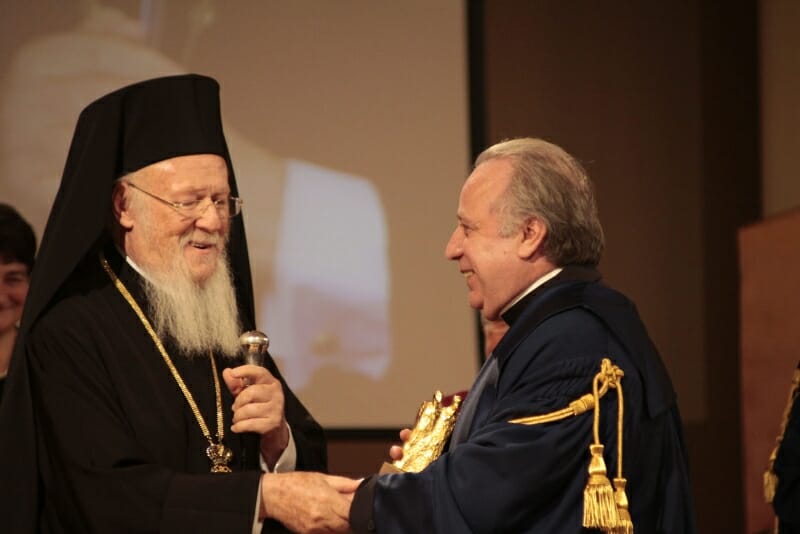
Foto © CSC Audiovisivi
“There are substantially two new aspects: firstly, the testimony of fraternity between Pope Francis and Patriarch Bartholomew. The message which the Holy Father sent to Bartholomew touched the Patriarch in a particular way, and he answered with the invocation of the prayer
multos annos for Pope Francis, so as to take a further step towards unity. And the second novelty which struck me is “unity in diversity,” which besides other things is a
leitmotif of many of Pope Francis’s discourses that underline how the Gospel is not uniformity but upholding the differences. They stand for unity precisely inasmuch as they spring from a sole source. They relate to one another and are able to reciprocally discover the gifts each of them conveys, due to which diversity is the gem of unity, especially when it is lived in relationship, that is, in fraternity and communion. To my mind these are two strong and new messages, that echo in a particularly effective manner, and are underlined by the way they touched the hearts of the great crowd present – 1,400 people – who responded to the fundamental parts of their speeches with intense rounds of applause that really came from the heart.”
In a world that raises barriers in the name of diversity and the refusal of the other, what responsibility do Christians have today? “A unique responsibility, since in reality, only Jesus brought into the history of mankind a model of unity that is able to hold differences together and that is able to make it valuable. No other human vision or human ideology has ever been able to bind unity and diversity as one. It either ended up in uniformity or anarchy. Jesus has shown us the way which is narrow, difficult and in the end, also entails a taking up of the cross. But it leads to the resurrection and transfiguration of the differences into unity. This is the pearl of the Gospel, unity in diversity, communion, and the Holy Trinity incarnated in the relationships with all, starting from the poor and the derelicts, as the Pope reminds everyone.”
Your continual reference to the Trinity to see what direction should be followed to achieve unity in diversity, strongly resembles the charism of Chiara Lubich and her vision of the “Trinitarian relationships” as the paradigm to be followed… “The
Sophia University Institute was the fruit of
Chiara Lubich’s inspiration, when she understood that the time had come for the charism, given to her by God and which had established the Focolare Movement, to become also a cultural expression. There is always need for mediations, paradigms – as Pope Francis says, a cultural revolution – so as to channel existence towards new frontiers. This is why Sophia University Institute was born: a new and tiny reality which is aware of all the limits of its initial stages and of human forces, but which is experiencing also the greatness of God’s Spirit, the charism of unity –the
ut unum sint which is the key of our time. That is why our effort is to culturally draw forth with prophetic vision, concreteness, and realism, the significance of this
paradigm of unity in diversity in politics (
the politics of fraternity), and in economics (the
Economy of Communion), at the level of philosophy (respect for the other), in all fields. I see the importance of such a deep harmony between what Pope Francis says (the mysticism of all as one, a Church that breaks its confines), and what Patriarch Bartolomew says (unity in diversity), the charism of unity given to our time … so as to make the journey together. The Holy Spirit is an artist, and infinitely disseminates gifts of all sorts but aims at one very precise project: today it may consist in the healing of these conflicts and gaps that divide humanity, to allow all the positive aspects existing to germinate, and infinite things already exist. So it has to be a laboratory of hope.”
Source: interview with various newspapers, after the conferment of the Doctorate to the Ecumenical Patriarch of Constantinople, Bartholomew I.
0 Comments